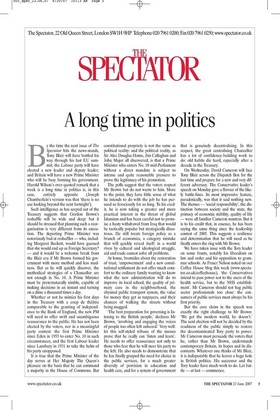A long time in politics
By the time the next issue of The Spectator hits the news-stands, Tony Blair will have battled his way through his last EU summit; the Labour party will have elected a new leader and deputy leader; and Britain will have a new Prime Minister who will be busy forming his government. Harold Wilson's over-quoted remark that a week is a long time in politics is, in this case, entirely apposite (Joseph Chamberlain's version was that 'there is no use looking beyond the next fortnight').
Such intelligence as has seeped out of the Treasury suggests that Gordon Brown's reshuffle will be wide and deep: but it should be stressed that planning such a reorganisation is very different from its execution. The departing Prime Minister was notoriously bad at reshuffles — who, including Margaret Beckett, would have guessed that she would end up as Foreign Secretary? — and it would be a welcome break from the Blair era if Mr Brown formed his government with more method and less madness. But as he will quickly discover, the methodical strategies of a Chancellor are not enough in No. 10. A Prime Minister must be preternaturally nimble, capable of making decisions in an instant and turning on a dime a thousand times a day.
Whether or not he mimics his first days in the Treasury with a coup de theatre comparable to the granting of independence to the Bank of England, the new PM will need to offer swift and unambiguous reassurance to the public. He has not been elected by the voters, nor in a meaningful party contest: the first Prime Minister since Eden in 1955 to enter No. 10 in such circumstances, and the first Labour leader since Lansbury in 1931 to take the helm of his party unopposed.
It is true that the Prime Minister of the day serves at Her Majesty The Queen's pleasure on the basis that he can command a majority in the House of Commons. But constitutional propriety is not the same as political reality: and the political reality, as Sir Alec Douglas-Home, Jim Callaghan and John Major all discovered, is that a Prime Minister who enters No. 10 mid-Parliament without a direct mandate is subject to intense and quite reasonable pressure to prove the legitimacy of his promotion.
The polls suggest that the voters respect Mr Brown but do not warm to him More to the point, they have little sense of what he intends to do with the job he has pursued so ferociously for so long. To his credit, he is now taking a greater and more practical interest in the threat of global Islamism and has been careful not to promise a hasty withdrawal from Iraq that would be tactically popular but strategically disastrous. He still treats foreign policy as a branch of economics, a category mistake that will quickly reveal itself: in a world riven by cultural and ideological struggle, aid and trade cannot solve all problems.
At home, bromides about the restoration of trust, 'empowerment' and a new constitutional settlement do not offer much comfort to the ordinary family wanting to know what the new administration will do to improve its local school, the quality of primary care in the neighbourhood, the abysmal public transport system, the value for money they get as taxpayers, and their chances of walking the streets without being mugged.
'The best preparation for governing is listening to the British people,' declares Mr Brown, 'involving and engaging the voices of people too often left unheard.' Very well: let this self-styled tribune of the masses prove that he really can 'listen and learn'. He needs to offer reassurance not only to those who fear that he will steer his party to the left. He also needs to demonstrate that he has finally grasped the need for choice in the public services, for a much greater diversity of provision in education and health care, and for a system of government that is genuinely decentralising. In this respect, the great centralising Chancellor has a lot of confidence-building work to do: old habits die hard, especially after a decade in the Treasury.
On Wednesday, David Cameron will face Tony Blair across the Dispatch Box for the last time and prepare for a new and very different adversary. The Conservative leader's speech on Monday gave a flavour of the likely battle-lines. Its most impressive feature, paradoxically, was that it said nothing new. The themes — 'social responsibility', the distinction between society and the state, the primacy of economic stability, quality of life — were all familiar Cameron mantras. But it is to his credit that, in essence, he has been saying the same thing since the leadership contest of 2005. This suggests a resilience and determination that he will need as he finally enters the ring with Mr Brown.
We have taken issue with the Tory leader on some fronts, notably his liberalism on law and order and his opposition to grammar schools. As Fraser Nelson noted on our Coffee House blog this week (www.spectator.co.uk/coffeehouse), `the Conservatives intend to pass power not to the users of the health service, but to the NHS establishment'. Mr Cameron should not hug public sector professionals too close: the consumers of public services must always be his first priority.
But the core claim in the speech was exactly the right challenge to Mr Brown: 'We get the modern world, he doesn't.' The next election will not be decided by the readiness of the public simply to restore the decontaminated Tory party to power. Mr Cameron must persuade the voters that he, rather than Mr Brown, understands contemporary Britain, its hopes and its discontents. Whatever one thinks of Mr Blair, it is indisputable that he leaves a huge hole in British politics. His successor and the Tory leader have much work to do. Let battle — at last — commence.





























































 Previous page
Previous page